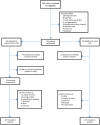Do post discharge phone calls improve care transitions? A cluster-randomized trial
- PMID: 25386678
- PMCID: PMC4227814
- DOI: 10.1371/journal.pone.0112230
Do post discharge phone calls improve care transitions? A cluster-randomized trial
Abstract
Importance: The transition from hospital to home can expose patients to adverse events during the post discharge period. Post discharge care including phone calls may provide support for patients returning home but the impact on care transitions is unknown.
Objective: To examine the effect of a 72-hour post discharge phone call on the patient's transition of care experience.
Design: Cluster-randomized control trial.
Setting: Urban, academic medical center.
Participants: General medical patients age 18 and older discharged home after hospitalization.
Main outcomes and measures: Primary outcome measure was the Care Transition Measure (CTM-3) score, a validated measure of the quality of care transitions. Secondary measures included self-reported adherence to medication and follow up plans, and 30-day composite of emergency department (ED) visits and hospital readmission.
Results: 328 patients were included in the study over an 6-month period. 114 (69%) received a post discharge phone call, and 214 of all patients in the study completed the follow outcome survey (65% response rate). A small difference in CTM-3 scores was observed between the intervention and control groups (1.87 points, 95% CI 0.47-3.27, p = 0.01). Self-reported adherence to treatment plans, ED visits, and emergency readmission rates were similar between the two groups (odds ratio 0.57, 95% CI 0.13-2.45, 1.20, 95% CI 0.61-2.37, and 1.18, 95% CI 0.53-2.61, respectively).
Conclusions and relevance: A single post discharge phone call had a small impact on the quality of care transitions and no effect on hospital utilization. Higher intensity post discharge support may be required to improve the patient experience upon returning home.
Trial registration: ClinicalTrials.gov NCT01580774.
Conflict of interest statement
Similar articles
-
A randomized trial exploring the effect of a telephone call follow-up on care plan compliance among older adults discharged home from the emergency department.Acad Emerg Med. 2014 Feb;21(2):188-95. doi: 10.1111/acem.12308. Acad Emerg Med. 2014. PMID: 24673675 Clinical Trial.
-
The Effect of a Care Transition Intervention on the Patient Experience of Older Multi-Lingual Adults in the Safety Net: Results of a Randomized Controlled Trial.J Gen Intern Med. 2015 Dec;30(12):1788-94. doi: 10.1007/s11606-015-3362-y. J Gen Intern Med. 2015. PMID: 25986136 Free PMC article. Clinical Trial.
-
Assessing the impact of nurse post-discharge telephone calls on 30-day hospital readmission rates.J Gen Intern Med. 2014 Nov;29(11):1519-25. doi: 10.1007/s11606-014-2954-2. J Gen Intern Med. 2014. PMID: 25103122 Free PMC article.
-
The effectiveness of family-centered transition processes from hospital settings to home: a review of the literature.Hosp Pediatr. 2015 Apr;5(4):219-31. doi: 10.1542/hpeds.2014-0097. Hosp Pediatr. 2015. PMID: 25832977 Review.
-
Integrated literature review of postdischarge telephone calls.West J Nurs Res. 2014 Jan;36(1):84-104. doi: 10.1177/0193945913491016. Epub 2013 Jul 4. West J Nurs Res. 2014. PMID: 23833254 Review.
Cited by
-
Adherence to common cardiovascular medications in patients with schizophrenia vs. patients without psychiatric illness.Gen Hosp Psychiatry. 2016 Jan-Feb;38:9-14. doi: 10.1016/j.genhosppsych.2015.07.010. Epub 2015 Jul 30. Gen Hosp Psychiatry. 2016. PMID: 26423559 Free PMC article.
-
Feasibility and performance of a patient-oriented discharge instruction tool for heart failure.BMJ Open Qual. 2019 Aug 19;8(3):e000489. doi: 10.1136/bmjoq-2018-000489. eCollection 2019. BMJ Open Qual. 2019. PMID: 31523726 Free PMC article.
-
Randomised controlled pragmatic clinical trial evaluating the effectiveness of a discharge follow-up phone call on 30-day hospital readmissions: balancing pragmatic and explanatory design considerations.BMJ Open. 2018 Feb 14;8(2):e019600. doi: 10.1136/bmjopen-2017-019600. BMJ Open. 2018. PMID: 29444787 Free PMC article. Clinical Trial.
-
Improving transitions of care for complex pediatric trauma patients from inpatient rehabilitation to home: an observational pilot study.Patient Saf Surg. 2015 Oct 15;9:33. doi: 10.1186/s13037-015-0078-1. eCollection 2015. Patient Saf Surg. 2015. PMID: 26478744 Free PMC article.
-
Factors Driving Patient Perception of Quality Care After Primary Total Hip and Total Knee Arthroplasty.J Am Acad Orthop Surg Glob Res Rev. 2018 Nov 8;2(11):e061. doi: 10.5435/JAAOSGlobal-D-18-00061. eCollection 2018 Nov. J Am Acad Orthop Surg Glob Res Rev. 2018. PMID: 30656258 Free PMC article.
References
-
- Roy CL, Poon EG, Karson AS, Ladak-Merchant Z, Johnson RE, et al. (2005) Patient safety concerns arising from test results that return after hospital discharge. Ann Intern Med 143(2): 121–8. - PubMed
-
- Poon EG, Gandhi TK, Sequist TD, Murff HJ, Karson AS, et al. (2004) “I wish I had seen this test result earlier!”: Dissatisfaction with test result management systems in primary care. Arch Intern Med 164(20): 2223–8. - PubMed
Publication types
MeSH terms
Associated data
Grants and funding
LinkOut - more resources
Full Text Sources
Other Literature Sources
Miscellaneous


